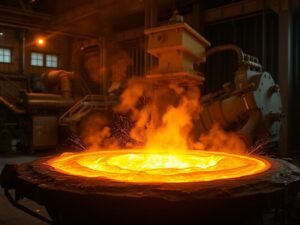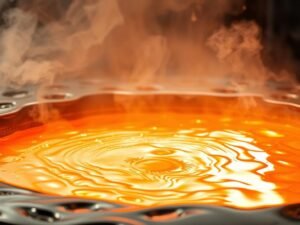
Mercury Density: The Weight of a Liquid Metal
Mercury, a unique element on the periodic table, is notable for being in a liquid state at room temperature. This characteristic, combined with its high

Mercury, a unique element on the periodic table, is notable for being in a liquid state at room temperature. This characteristic, combined with its high

Zinc is a bluish-white, lustrous metal with a relatively low melting temperature of 419.5°C (787.1°F), making it an ideal material for various machining processes. The

Nickel, a versatile transition metal with the chemical symbol Ni and atomic number 28, is a fundamental element in various industries. The property that significantly

Tungsten stands out among all metallic elements due to its exceptionally high melting point of 3,422°C (6,192°F). This remarkable property makes tungsten invaluable for applications

Tungsten, symbolized as W, is renowned for being one of the densest metals available, with a remarkable density of approximately 19.3 grams per cubic centimeter

Titanium is renowned for its exceptional strength and resistance to high temperatures. A key factor contributing to these properties is its high melting point, approximately

Titanium is a remarkable metal known for its exceptional balance of low density and high strength. With a density of 4.51 g/cm³, it is approximately

Stainless steel is renowned for its exceptional corrosion resistance and durability, making it a versatile alloy in various industrial and commercial applications. The temperature at

Understanding the density of stainless steel is crucial for selecting the right material for various applications, from construction to medical devices. The density of a

The melting point of silver, approximately 961.8°C (1,763.2°F), is a crucial property that influences its use in various industries, from jewelry making to electronics. Understanding
The production of microchips relies heavily on the properties of silicon, a fundamental element in modern electronics. At a melting point of 1414°C (2577°F), silicon

Polyvinyl chloride, a versatile thermoplastic, plays a significant role in various industrial and commercial sectors. Its thermal properties allow for effective processing and shaping. The

Polyurethane, a versatile polymer, is composed of organic units joined by carbamate links. Its unique chemical structure allows for a wide range of applications, from

Understanding the melting point of polypropylene is crucial for various industrial applications. This thermoplastic polymer is known for its durability and resistance to heat, making

Metals are known for their resilience in harsh environments, including high temperatures. Equipment such as combustion engines, jet engines, and furnaces are frequently subjected to

Polycarbonate is a versatile polymer known for its exceptional balance of properties, making it a staple in modern engineering and manufacturing. The unique density of

Platinum is renowned for its extraordinary properties, particularly its high melting point of 1772°C, making it an ideal material for applications that require extreme temperature

Plastics have become essential materials in modern society, with applications ranging from everyday objects to industrial manufacturing, electronic devices, and medical equipment. The density of

Understanding the behavior of PLA under various temperatures is crucial for achieving optimal results in 3D printing. As one of the most common thermoplastics used

Understanding the properties of metals is crucial in selecting the right material for various applications. One fundamental property that determines how metals perform in different

Nylon is a family of synthetic polymers known for their versatility and wide range of applications. Characterized by amide linkages, these thermoplastics can be melt-processed

Understanding the density of various materials is crucial in engineering and scientific applications. Density, defined as an object’s mass per unit volume, is a fundamental

Mercury is a fascinating element, being the only metal that remains liquid at room temperature. This unique physical property makes it a subject of interest

316 stainless steel is renowned for its exceptional corrosion resistance and durability, making it a preferred material in various industries, including marine environments. This austenitic

Understanding the thermal properties of plastics is crucial in manufacturing and product development. The temperature at which a plastic melts, known as its melting point,

Polyvinyl chloride, commonly known as PVC, is a versatile polymer valued for its flexibility, longevity, and cost-effectiveness. It is widely used in plumbing fixtures, medical

The temperature at which a metal transitions from a solid to a liquid is crucial in various engineering applications. Understanding the melting behavior of metals

Nickel is a crucial metal in various industrial applications due to its exceptional heat resistance. With a melting point of 1,455°C (2,651°F), nickel can withstand

Iron, a fundamental element in the Earth’s crust, is a crucial material in various industries due to its unique properties. One of its key characteristics

Understanding the melting point of polypropylene is vital for various plastic processing operations. The melting point, typically ranging between 130°C to 171°C, is a critical
Precision, durability, and customization—partner with a trusted CNC machined aluminum parts manufacturer to bring your designs to life with unmatched quality and efficiency.